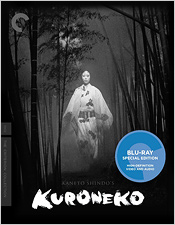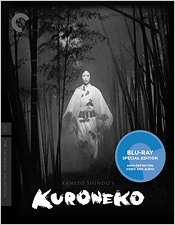Kuroneko (Blu-ray Review)

Director
Kaneto ShindoRelease Date(s)
1968 (October 18, 2011)Studio(s)
Kindai Eiga Kyokai (Criterion - Spine #584)- Film/Program Grade: A-
- Video Grade: B+
- Audio Grade: B
- Extras Grade: B
Review
When you think of Japanese horror cinema, one of the first things that should jump to mind is ghosts. Japanese filmmakers seem to have cornered the market on spooky tales of restless spirits seeking vengeance from beyond the grave. While other cultures concentrate on making the audience jump, the Japanese focus on the more eerie aspects of ghost stories. Kaneto Shindo’s Kuroneko may not be as well known in the U.S. as such films as Kwaidan, it’s every bit as effective and disquieting as any Japanese horror film.
The movie opens with a band of samurai invading the home of a widow (Nobuko Otowa) and her daughter-in-law (Kiwako Taichi). The samurai rape and kill the two women, burn down their house, and disappear into the trees. Years later, a new house has appeared on that spot, inhabited by two ethereal but strangely familiar women. They begin luring samurai to their home and killing them one by one. The local warlord enlists a new samurai to deal with the threat: the son and husband of the women (Kichiemon Nakamura).
Kuroneko is a dark, haunting, often beautiful horror entry that emphasizes atmosphere over scares. Shindo films the action with an almost painterly eye, particularly in the film’s many night sequences. The movie’s stillness gives its sporadic bursts of violence even more power. When Nakamura enters the picture, it’s fascinating to see both how he deals with these women who are clearly no longer the family he left behind, as well as how the spirits struggle with how to deal with him. Kuroneko is deeper and richer than your average ghost story, all of which just helps make it even creepier.
Criterion has been almost single-handedly responsible for proving that black-and-white movies have a place on Blu-ray. That track record continues here with a gorgeous new transfer. It’s crisp and detailed with clean whites that truly sparkle. The uncompressed mono soundtrack is perfectly adequate. Extras include an hour-long interview with Kaneto Shindo from 1998 reflecting on his long, varied career and a 17-minute interview with film critic Tadao Sato on Kuroneko. Both are very interesting and worth your time. The booklet includes an essay by Maitland McDonagh and an excerpt from a 1972 interview with Shindo.
For fans of Japanese cinema, horror or not, Kuroneko is a valuable rediscovery. It’s a chilling, provocative work that slowly creeps up on you. I’m surprised this gem has flown under the radar for so long. Thanks to Criterion for giving it another chance to find its audience.
- Dr. Adam Jahnke

